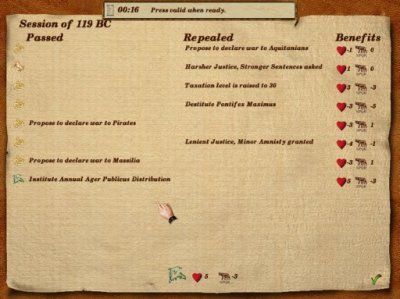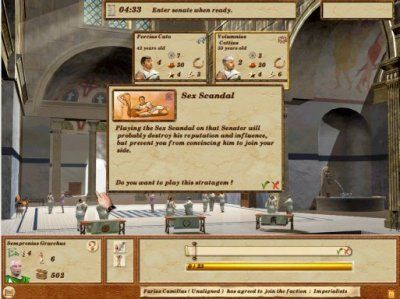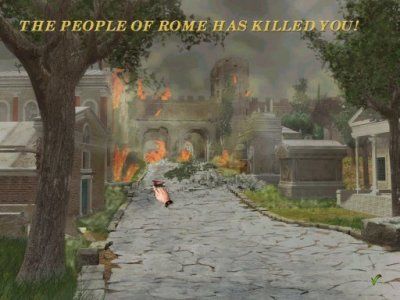The Empire that was Rome has long been of interest to many of us. Rome's early years are shrouded in mystery, but it was the era known to scholars as Republican Rome that saw this nation at its most dynamic, and probably its most interesting. A small town in a backward place would rise to be the greatest power the western world would ever see. Pax Romana is a new game that attempts to simulate the glory, intrigue, and conquests of Rome, and places you in the position of leader of the mighty power known as Rome.
Pax Romana is the latest effort from Galilea Multimedia, and the game's designer also worked on the popular Europa Universalis, so this game is vaguely similar to that system. You are presented with two levels of play, a strategic mode in which, as head of a Roman faction, you improve provinces, hammer out trade routes and raise troops, while conducting land and sea operations. The second mode is political, where you attempt to meet senators, win them over to your faction, attempt to raise money and influence in Rome, and try to win elections that will make your faction strong and propel you into the leadership of Rome.
The game includes a rather confusing and poorly written game manual, and a truly poor set of tutorials. The game manual is rife with spelling and grammatical errors, and these are repeated in the game itself, one of the tutorials is broken, and since this tutorial is quite important, valuable game concepts simply can't be grasped easily. The other tutorials have another problem, the text sheet is an semi-transparent overlay of the game board, that cannot be hidden, and blocks the actions it instructs the players to do, making it extremely difficult to grasp this very complex game. If you are able to fight through these difficulties, you actually find a pretty decent and entertaining game underneath these amateurish mistakes. It also doesn't help that there are no less then ten tutorials, and even after playing them, you might still have little clue of what is going on.
The strategic game is set up in a number of scenarios, starting with the Punic wars, in which you must obtain a specified goal, usually the conquest of provinces and/or the defeat of other nations. Along the way to doing this, you must recruit troops, improve roads, clear land, found trade routes and balance your budget, while Latinizing people and surpressing revolts. The armies in the game are commanded by separate leaders that can be recruited, and have differing ranks and abilities, as well as command spans. As faction leader, you can also play a number of strategies, these are supplied to your faction, that can improve combat ability, as well as other game factors. In the strategic mode, the game plays very much like the Europa Universalis series, but with more complexity and detail, and truly amazing amount of events and information pop-ups. Unfortunately, sub screens cover all four sides of the game map, and since nothing is labeled, you have to run your mouse over the pictures to see what the buttons do, and quite often, important information is covered or presented in a confusing manor. Battles are abstracted, but you can play tactics and pick different types of attacks and defenses, which can influence combat .The game also allows sieges and seige warfare, so critical to Roman warfare
The political game includes all that is in the strategic game, but adds new screens, options, and problems as well as challenges. Each year, you are placed in Rome, and you have a very limited amount of time to enter buildings, in which you must recruit senators, equates for finance, tribunes, consult the omens, and the gods, and then, in true beat the clock fashion, rush to the senate. Once there, you can put forth things for the senate to vote for, denounce others, change whether Rome is harsh or just towards criminals, and other such duties as the Romans undertook. Of prime importance are the elections, which can make you rich and powerful, and which you can influence honestly or dishonestly, attack your rivals, and even attempt assassinations. Because the designer choose to add a timer, this sequence, which could be a lot of fun, feels rushed, and you often feel the game is cheating you of the opportunity to enjoy the game.
PAX ROMANA VERDICT
The end result of all of this is a game which could have been a true classic, but isn’t. You end up with a product that seems to have been rushed, with a lot of bugs, and frustrating mistakes that hurt game play. The intense difficulty of this game doesn’t help it either, I had to go the game’s forums to get a grasp of what to do, and there you can download a much better game manual then the useless one that comes in the box. If you are a big fan of extremely complex strategic games, Pax Romana is worth getting, but the average gamer with a passing interest in this era should pass on this one, as it is just a bit of an over-reach by the game designer.







